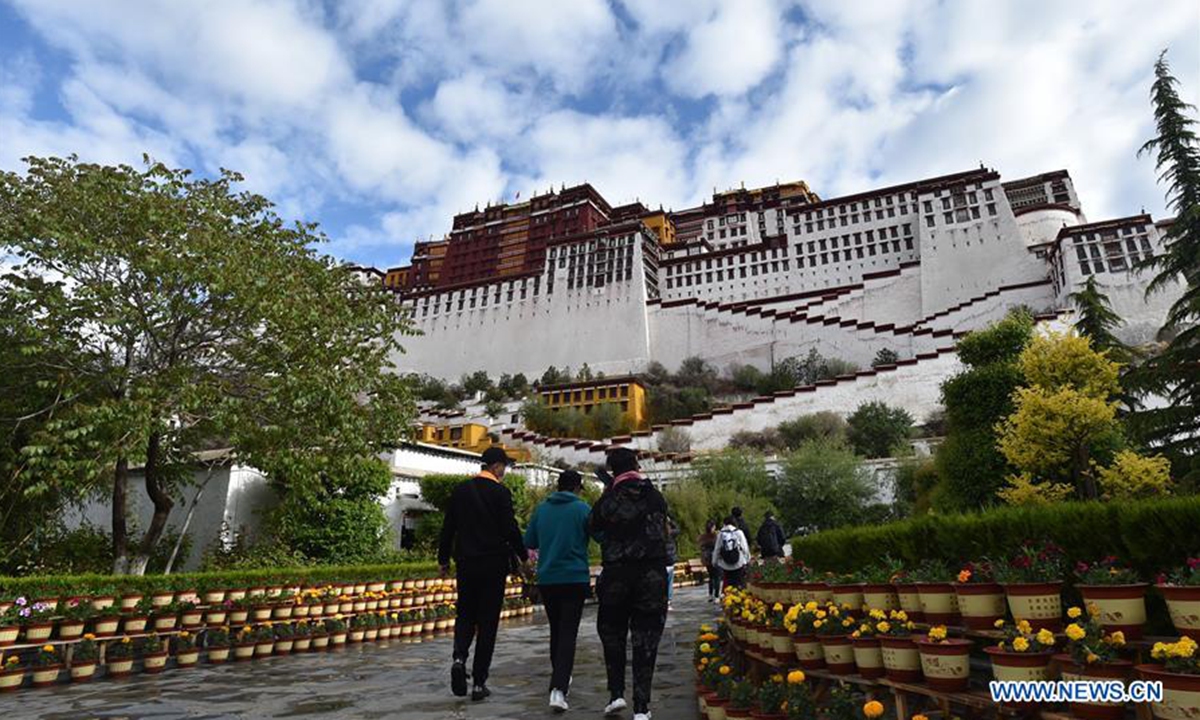China’s ethnic regions see far fewer COVID-19 cases than national average
By Hu Yuwei Source:Global Times Published: 2020/6/3 20:38:41

Visitors head for the Potala Palace in Lhasa, capital city of southwest China's Tibet Autonomous Region, June 3, 2020. The Potala Palace reopened to the public on Wednesday. Visitors to the Potala Palace must first make online reservations while their number will be strictly controlled, according to an announcement issued Tuesday by the administration of the palace. The 1,300-year-old palace has been closed since Jan. 27 due to the spread of the novel coronavirus. (Xinhua/Chogo)
Unlike in the US, ethnic groups in China can always enjoy an equal test and treatment during the outbreak and their safety and health are a priority of the local government, said human rights experts.
China has always stressed rights protection for vulnerable groups, providing basic hygiene facilities to under-resourced communities, and caring for people who have a higher risk of being infected with COVID-19.
Analysts said such care was evident in China's strict measures reaching out to the most remote and impoverished areas in the country where the medical authority has sent experts to Southwest China's Tibet Autonomous Region, for example, to enhance border administration and avoid imported cases from neighboring countries.
Village committees constantly promote the importance of virus prevention, sharing written and audio materials in Tibetan language through WeChat.
When the situation improved, they visited the herdsman families in valleys, to give out medicine and share information.
The National Health Commission has sent batches of experts to provincial regions in Southwest China, including Yunnan, Tibet and Guangxi where minority groups predominately reside. The experts helped each border port to make a unique strategy to decrease the risk of imported cases.
China saw very low infection rates in ethnicity areas including Northwest China's Xinjiang Uygur Autonomous Region and Tibet, which experts said is largely due to targeted pamphlets and videos promoting prevention measures with ethnic languages and cultures.
Tibet only reported one confirmed case of the coronavirus, a tourist from Wuhan, Central China's Hubei Province.
Measures in Xinjiang follow a unified approach: patients are hospitalized for treatment which is case-specific at designated hospitals where medical experts and resources are assembled. In treatment, traditional Chinese medicine, including Uygur medicine, is equally incorporated.
In Northeast China's Yanji, a border city with North Korea, it is also common to see bilingual volunteers of university students participating in community screening, disinfection and material distribution.
Unlike American minorities who are easily discriminated by some mask-phobic and racist people in the US, China's ethnic groups have always been equally protected and respected, Du Fachun, a professor at Yunnan Agricultural University who studies the resettlement, told the Global Times.
The Derung ethnic people living along the deep gorges of the Dulong River in Dulongjiang Township, Southwest China's Yunnan Province, is one of the country's smallest ethnic groups that was lifted out of poverty in 2018.
The ethnic group has been the envy of Myanmar's ethnic minorities on the other side of the border for adequate food and free virus screening the Chinese government provided during COVID-19, Du observed in his recent visit to the township. "China's ethnic policy is complete and comprehensive, which highlights its advantages especially in comparison with the US in the epidemic," Du said.
RELATED ARTICLES: